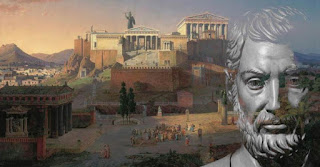Posted by Emile Wolfaardt
The human spirit is born yearning innately and continually for freedom. It seems that from the day we are dragged reluctantly out of the womb to our final rasping breath, we find the imposition of limitations an injury to our sensibilities.
We seek instinctively the dismissal of all censorship. Similarly, we feel we are our own source and standard for truth. Any burden of constraint or requirement that is not consistent with our opinion, we tend to naturally devalue and disqualify. Nature itself seems somehow complicit in denying us our freedoms as we look to the birds and cry, ‘Oh that I had wings like a dove.’
It was while seeking to throw off the restraint of British shackles in 1775 that the revolutionary lawyer and governor Patrick Henry stood in front of the Virginia legislature and implored, ‘I know not what course others may take, but as for me, give me liberty, or give me death!’
Yet the truth is that neither the bird, nor Patrick Henry, nor the human spirit is actually free, nor can they be! The bird cannot rise to altitudes where there is no oxygen. Mr. Henry could not derail the adoption of US Constitution despite his commitment to do so, and you and I, no matter who we are, live with a myriad of restrictions that we reasonably cannot defy.
What does it mean to be really free? Should Colin Kaepernick be free to ‘take the knee’, or Edward Snowden to publish classified information? Should the South African government be free to deport foreigners, or local sub-culture groups be free to articulate their prejudices? Should pastors, florists and bakers be forced to provide their services for same-sex weddings and celebrations that violate their religious beliefs? What if we flip the question? Should a homosexual graphic designers or printers be forced to create flyers for a rally opposing same-sex marriages?
Here is why the discussion may be more complex than simply shouting ‘freedom’ as loudly as one can, then giving one’s life to make that statement somehow more meaningful.
• Freedom is Both Relative and Subjective
It is relative because we tend to evaluate freedom by comparing it to the freedom of others, or the freedom we enjoyed in previous situation. When Martin Luther King declared “Free at last, free at last, thank God Almighty, we are free at last!” he was still part of a system of opression that had not yet changed.
It is subjective because it depends on your one’s mindset. The same group of militia may be called ‘freedom fighters’ or ‘terrorists’ depending on what side of the table they sit on. The psychiatrist and philosopher Viktor Frankl faced the incredible horrors of Auschwitz. With 6 million others, he was stripped of everything, including his dignity. But in the depth of his suffering, Frankl decided that there was a part of him the Nazis could never touch – and that was his choice to be positive, to have and optimistic outlook. That was his choice for freedom.
• Freedom is Both Negative and Positive
The concept of negative and positive freedom was popularized in an essay by the philosopher Isaiah Berlin published in 1958, ‘Two Concepts of Liberty’.
Negative freedom centres on freedom from interference by others. It focuses on my freedom to act according to the dictates of my conscience without others preventing me from doing so. It asks, ‘In what areas am I master?’
Positive freedom is a little more tricky – it is about my right to do something rather than limiting the interference I may encounter from others. It is about my freedom to do, say, associate, worship, and express as I choose to.
However we define it – at the end of the day, we are as free as we choose to be – because freedom is more a state of mind than of circumstances. Circumstantially, we will never be free. There will always be limitations imposed by nature, governments, others, and even our own minds and bodies. That is not where true freedom is found.
The battle for freedom is fought and won in the mind. When we empower the actions of others to determine our state of mind, we empower them to determine our freedom. Freedom is available to all. The wisdom principle of freedom is simply this:
Where the freedom of one infringes on the freedoms of another, the net result is less freedom for all. As a matter of fact, the entire judicial system is purposed on this principle.
Nelson Mandela wrote, ‘To be free is not merely to cast off one’s chains, but to live in a way that respects and enhances the freedom of others.’ His autobiography, ‘Long Walk to Freedom’, was not primarily about political or physical freedom, although that was both the context and the occasion of his writing. It was about the choice to be free in his inner being, in his mind, and to afford others with the same respect and opportunity.
So, perhaps we should all take that long walk – and find the freedom in our minds. Mind chains are a terrible task-master to serve – and freedom is simply a choice away.










